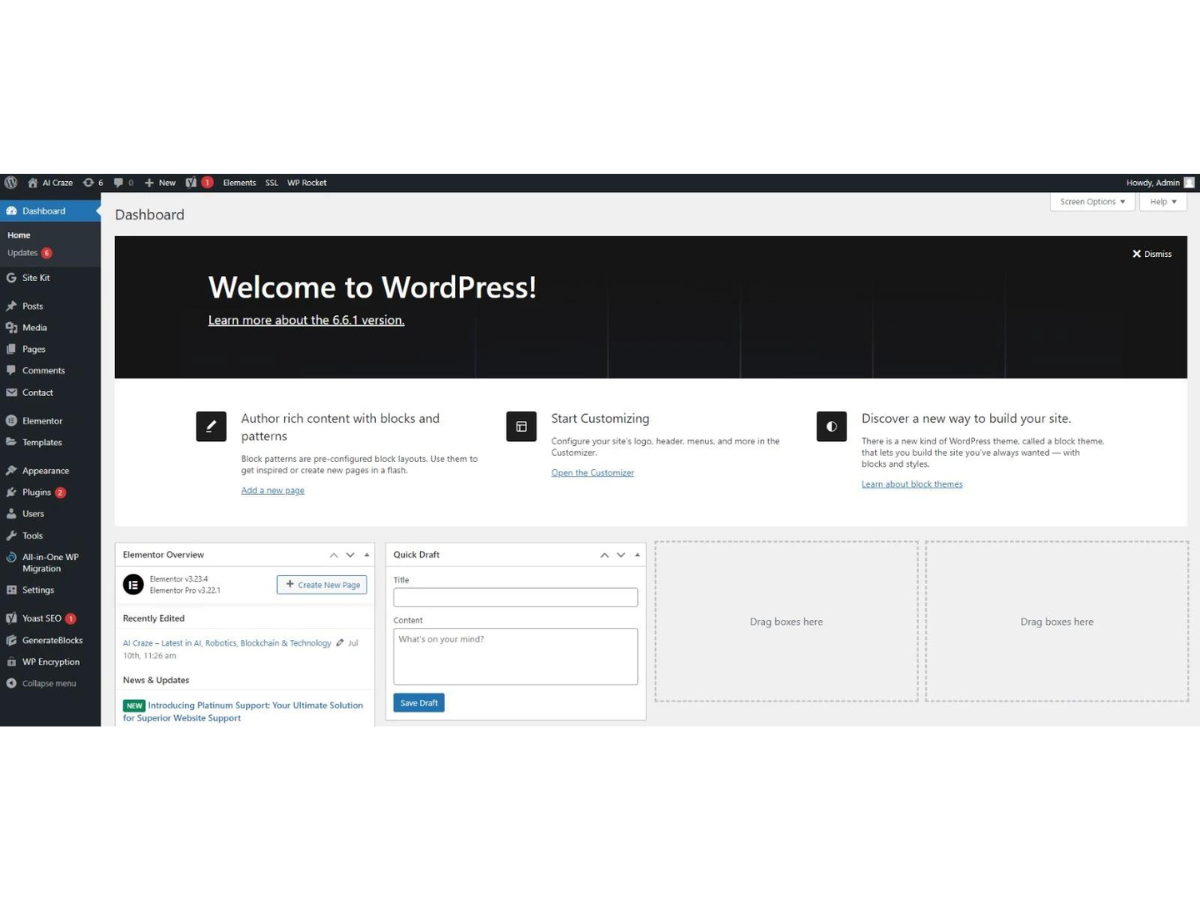What is WordPress and Why it is a best CMS for websites?

WordPress is a name that resonates profoundly within the realms of web development and content management. Launched in 2003 by Matt Mullenweg and Mike Little, WordPress started as a simple blogging tool but has evolved into a robust and flexible content management system (CMS) that powers over 43.5% of all websites on the internet. Around 478 million websites are built on WordPress. WordPress dominates the CMS market with a 62.7% share. There are over 30,000 WordPress themes available. This article explores what WordPress is, its core functionalities, and the crucial roles of plugins and themes in enhancing its capabilities.
At its core, WordPress is an open-source content management system that enables users to create, manage, and modify content on their websites without needing to know how to code. The platform’s open-source nature means that its source code is available for anyone to study, modify, and enhance. This has fostered a massive community of developers and enthusiasts who continually contribute to its growth and improvement.
Key Features of WordPress
User-Friendly Interface: WordPress boasts an intuitive interface that allows users to easily navigate and manage their websites. Its dashboard provides access to all site management tools from writing posts to changing settings.
Flexibility and Customization: Whether you are running a personal blog, an e-commerce site, or a portfolio, WordPress can be tailored to meet your needs. The platform’s flexibility is one of its most significant strengths.
SEO-Friendly: WordPress is designed with search engines in mind. Its clean code and structure make it easier for search engines to index sites. There are numerous plugins available to enhance SEO capabilities further.
Responsive Design: WordPress themes are typically designed to be responsive, meaning they adjust to fit various screen sizes, from desktops to mobile devices.
Media Management: The platform offers robust media management, allowing users to upload, edit, and organize images, videos, and other media files easily.

The Role of Plugins in WordPress
One of the features that set WordPress apart from other CMS platforms is its extensive plugin ecosystem. Plugins are essentially pieces of software that can be installed on a WordPress site to add new features or enhance existing ones. There are thousands of free and premium plugins available catering to virtually every need you might have.
Key Functions of Plugins
Extending Functionality: Plugins can add a wide range of functionalities to a WordPress site. For instance, e-commerce plugins like WooCommerce turn a simple website into a fully functional online store.
Enhancing Performance: Plugins such as caching tools (e.g., W3 Total Cache) and image optimization plugins (e.g., Smush) can significantly improve site performance by reducing load times and optimizing resource usage.
Improving SEO: SEO plugins like “Yoast SEO” and “Rank Math” provide comprehensive tools to optimize your site’s content, meta descriptions and keywords helping to improve search engine rankings.
Security Enhancements: Security plugins like Wordfence and Sucuri Security offer features such as firewalls, malware scanning, and login protection, helping to safeguard your site against cyber threats.
Custom Forms and Surveys: Plugins like Contact Form 7 and WPForms make it easy to create custom forms, surveys and other interactive elements to engage with site visitors.
The Importance of Themes in WordPress
Themes in WordPress are essentially templates that define the appearance and layout of a website. They provide the design framework, allowing users to change the look and feel of their site with just a few clicks. Like plugins, there is a vast array of themes available ranging from free options to premium themes with advanced features.
Key Functions of Themes
Defining Site Aesthetics: Themes control the visual aspects of a website including layout, color schemes, typography, and overall design. A well-chosen theme can significantly enhance the user experience and branding of a site.
Responsive Design: Most modern themes are designed to be responsive, ensuring that the website looks good and functions well on all devices, from desktops to smartphones.
Customization Options: Premium themes often come with extensive customization options allowing users to tweak various elements of their site without needing to touch the code. This can include custom headers, footers, widgets, and more.
Integration with Plugins: Good themes are designed to integrate seamlessly with popular plugins ensuring that additional functionalities do not disrupt the site’s design and user experience.
Performance Optimization: High-quality themes are coded to be lightweight and efficient, helping to improve site performance and load times.
A Very Important Question: Why Use WordPress for Your Website?
Choosing the right platform for your website is a crucial decision that can impact its success and functionality. WordPress is one of the most popular choices, and for good reason. This section will explore why using WordPress for your website is a smart decision, highlighting its benefits and advantages.
Easy to Use and Manage
WordPress is known for its user-friendly interface, which makes it accessible even for beginners. The platform’s dashboard is intuitive and straightforward. This allows users to manage content, add new pages, and customize their site’s appearance without any coding knowledge. The ease of use ensures that anyone can create and maintain a professional-looking website.
Highly Customizable
One of the most significant advantages of WordPress is its flexibility and customization options. With thousands of themes and plugins available, users can tailor their websites to meet specific needs and preferences. Whether you are running a blog, an e-commerce store, or a corporate site, WordPress provides the tools to make your vision a reality.
Search Engine Optimization (SEO) Friendly
WordPress is designed with SEO in mind, making it easier for your website to rank well in search engine results. The platform’s clean code and structure are optimized for search engines, and there are numerous plugins available, such as Yoast SEO, that provide advanced SEO features. These tools help you optimize your content, meta descriptions and keywords to improve visibility and attract more visitors.
Responsive Design
In today’s digital age, having a mobile-friendly website is essential. Most WordPress themes are designed to be responsive, meaning they automatically adjust to fit different screen sizes and devices. This ensures that your website looks and functions well on desktops, tablets and smartphones providing a seamless user experience across all platforms.
Strong Community Support
As an open-source platform, WordPress has a vast and active community of developers, designers, and users who contribute to its growth and improvement. This community offers extensive support through forums, tutorials, and documentation. This makes it easier to find solutions to any issues you may encounter. The continuous contributions from the community ensure that WordPress remains up-to-date and secure.
Secure and Reliable
Security is a top priority for any website owner. WordPress is continually updated to address security vulnerabilities and provide a safe environment for your site. There are numerous security plugins available, such as Wordfence and Sucuri, that offer advanced protection against threats like malware, hacking and spam.
Cost-Effective
Building and maintaining a website can be expensive but WordPress offers a cost-effective solution. The platform itself is free to use and many themes and plugins are available at no cost. Even premium themes and plugins are often more affordable than hiring a developer to create custom solutions. This makes WordPress an excellent choice for individuals and businesses on a budget.
Scalable and Flexible
WordPress is highly scalable, meaning it can grow with your business. Whether you are starting with a simple blog and expanding to an e-commerce site, or adding new features and functionalities over time, WordPress can handle it. The platform’s flexibility ensures that it can adapt to your changing needs and support your website’s growth.
Easy Integration with Other Tools
WordPress integrates seamlessly with a wide range of third-party tools and services such as social media platforms, email marketing services and payment gateways. This makes it easy to enhance your website’s functionality and connect with your audience through multiple channels.
Regular Updates and Improvements
WordPress is continually evolving with regular updates that introduce new features, improve performance and enhance security. These updates ensure that your website remains current and competitive in the ever-changing digital landscape.

Add a Comment